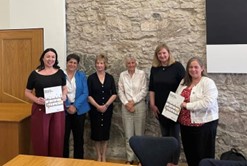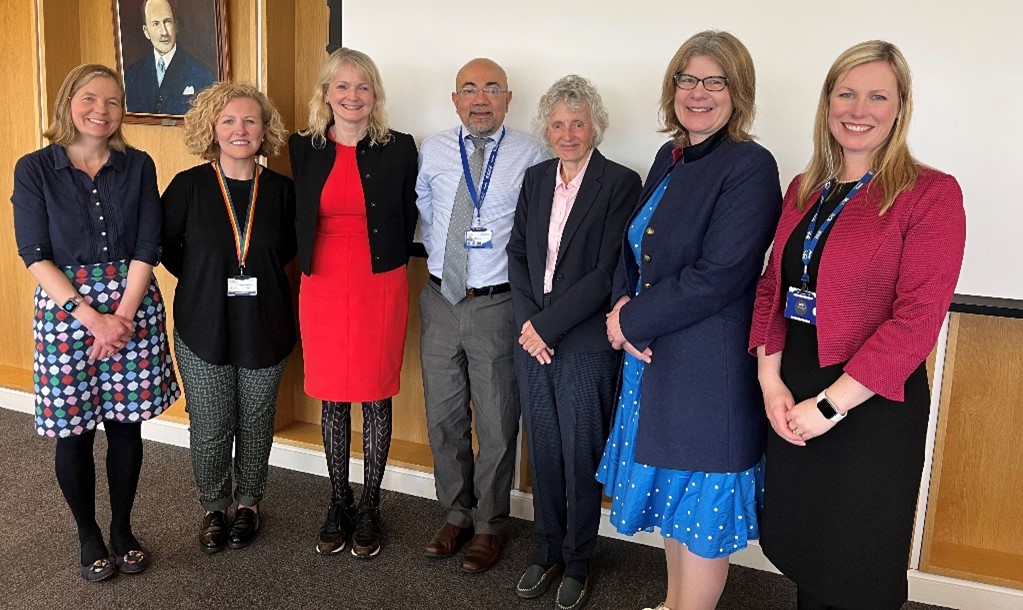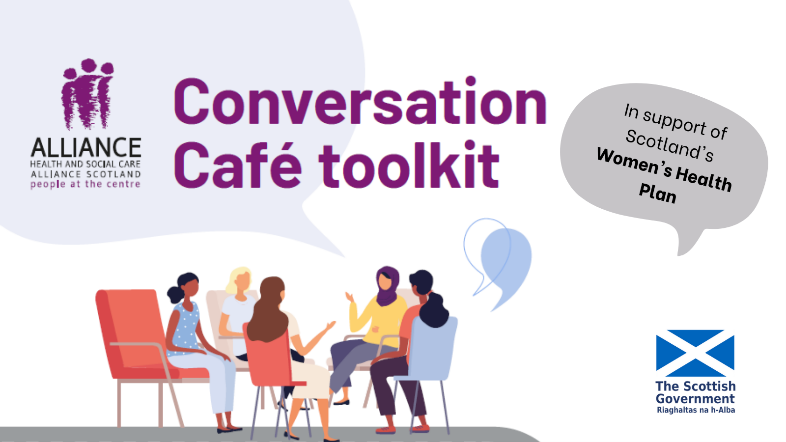Health and Social Care
Five enjoyable months
July 14, 2023 by Professor Anna Glasier No Comments | Category Women's Health Champion
I have now spent five very stimulating and enjoyable months as Scotland’s Women’s Health Champion and it is time to give you an update on what I have been doing.
I am continuing to meet with people working in Women’s Health in Scotland including organisations in the third sector.
With the Scottish Government’s Women’s Health Team, in late May I visited Aberdeen where we had an extremely positive meeting with members of Grampian Health Board including the non-executive Chair, Alison Evison. Among other topics we discussed progress with the new Baird Family Hospital and the opportunities that brings for consideration of providing health care a little differently. Professor Bhattacharya arranged an afternoon session with colleagues from the University of Aberdeen for a stimulating discussion about research priorities linked to the Women’s Health Plan.
In June, the Team visited the Chalmers Centre in Edinburgh for an overview of Women’s Health services in NHS Lothian. We have already followed up on that visit with more detailed discussions about certain aspects including services for women with pre-menstrual syndrome. We also visited NHS Greater Glasgow and Clyde for a similar meeting with service providers and we were delighted to hear from three of our GP colleagues who provided valuable insights into women’s health and primary care. Despite both meetings highlighting the many challenges services are facing across Scotland, the enthusiasm for women’s health and the Plan was evident. Our thanks to Rebecca Miller and Louise Carroll for organising these meetings. Finally we had a remote meeting with the Women’s Health Team from NHS Dumfries and Galloway at which Professor Marion Bain, the Interim Deputy Chief Medical Officer, presented on the Women’s Health Plan, leading to a lively discussion about local initiatives.
You are probably all aware that a new Minister for Public Health and Women’s Health, Ms Jenni Minto, was appointed in March 2023. I was delighted to attend a visit to University of Edinburgh with the Minister to hear about the research being undertaken by the EXPPECT endometriosis and pelvic pain team, some of which is funded by the Scottish Government.
At the end of June, the Minister organise d a meeting with me, Professor Bain and Women’s Health Spokespeople from opposition parties to discuss areas of common interest in relation to Women’s Health. I hope that our shared passion for Women’s Health will allow us to work together to achieve the aims of the Women’s Health Plan. Everyone agreed that a follow-up meeting would be useful and I plan to personally meet with individual MSPs to discuss initiatives in their constituencies.
d a meeting with me, Professor Bain and Women’s Health Spokespeople from opposition parties to discuss areas of common interest in relation to Women’s Health. I hope that our shared passion for Women’s Health will allow us to work together to achieve the aims of the Women’s Health Plan. Everyone agreed that a follow-up meeting would be useful and I plan to personally meet with individual MSPs to discuss initiatives in their constituencies.
Meeting with organisations from the third sector – including Endometriosis UK, the Royal Osteoporosis Society, PCOS Relief, and most recently Chest Heart and Stroke Scotland (CHSS) – always turn out to be extremely interesting and useful. They often provide an opportunity to meet people with lived experience who give a unique and extraordinarily personal perspective on various conditions but they also give us interesting ideas for next steps in progressing actions within the Plan.
We now have a Women’s Health Lead in almost every Health Board and we meet regularly through our Women’s Health Lead’s Network. This group is critically important in making things happen around Scotland and it is a great forum for sharing ideas of how to do things differently. Some of the Leads have told us that they would welcome more discussion around women’s heart health and so for the next meeting we will focus on this topic and invite third sector representatives to attend and be part of our deliberations.
We now have two new national clinical groups giving clinicians a forum to discuss challenges, successes, solutions and even difficult cases involving menopause and menstrual health. Another national short life working group is trying collectively to tackle the issues common to all health boards in meeting the demand for long-acting methods of contraception (LARC) particularly intrauterine devices and systems. We all recognise the value of the levonorgestrel-releasing device (Mirena®) in preventing not only unwanted pregnancy but also heavy menstrual bleeding as well as providing the progestogen for menopausal hormonal replacement therapy. I have promised to involve the Minister for Women’s Health personally in my efforts to find a solution to the challenge.
After five months of meetings, I now have a clearer idea of two particular initiatives that I would like to take forward with the help of the policy teams in Scottish Government and partners across Scotland.
The Plan emphasises the need to address women’s health inequalities. Following discussions with representatives of the Royal College of General Practitioners and the Scottish Deep End Project we are working on a proposal for a pilot study involving taking a specialist Women’s Health Service to a number of Deep End Practices. The service would offer all aspects of sexual and reproductive health care but also use the opportunity to assess risk factors for cardiovascular disease and take action accordingly. This project would need to be done in an affordable and sustainable way such that scaling up across all Deep End practices would be realistic and, to this end, the processes and outcomes would need to be very carefully evaluated.
My second initiative concerns contraception and the prevention of unintended pregnancy. It has been suggested that the rise in abortion rates in young women in Scotland may be due, in part, to young women’s lack of confidence in hormonal contraception in favour of other approaches which may include natural family planning and periodic abstinence using mobile phone apps to determine the risk of conception. The findings from the recent Scottish Government publication on women’s experiences of discrimination and the impact on health and the Young Women’s Movement report on experiences of accessing healthcare echo young women’s concerns about hormonal contraception. I’m keen to explore this further with young women, to understand their concerns and think about the ways in which we can support them. There is a great deal of information available on NHS Inform and elsewhere which gives people of all ages accurate information of the risks and benefits of all available contraceptive methods. By promoting the use of these resources we hope that we can start to ensure that young women are well informed about the pros and cons of hormonal methods be that for contraception, heavy menstrual bleeding or for helping to treat conditions such as Polycystic Ovary Syndrome (PCOS).
On the topic of PCOS, The Medical Research Council (MRC) Centre for Reproductive Health in Edinburgh has produced a new animation which describes our understanding PCOS in a simple and accessible way. The short film offers an insight into patient experience of the condition, the best ways to manage PCOS, and guidance of where to seek support. I am pleased that it is now also available to watch on NHS Inform.
Also on NHS Inform is brand new content for women on the pelvic floor, what it is and why its so important; urinary continence, prevention and what to do if you find you are experiencing symptoms; and prolapse, what it is and how to get help if you need it. These problems are common yet women often feel too embarrassed to speak to anyone about their symptoms. It is really important that we offer reassurance and ensure that there is easily accessible information available which explains the things women can do to reduce the chance of this happening and improve any symptoms and how to access further help if needed.
I have many more meetings and discussions lined up over the next couple of months. Once again I would like to thank everyone for giving me so much time and support including the members of the Scottish Government Women’s Health Plan team who are always unfailingly interested and positive. I feel incredibly fortunate to be the Women’s Health Champion but I am impatient to be able to make some tangible difference to Women’s Health in Scotland.
Women’s Health Highlights:
CivTech Menopause Innovation Challenge
The CivTech menopause challenge was launched on 27 June, in partnership with the Chief Scientist Office (CSO) and the NHS Scotland Innovation Hubs (Health Innovation South East Scotland, North of Scotland Innovation Hub, West of Scotland Innovation Hub). The challenge seeks to improve women’s access to the right support for their menopause, including individualised support. We know that many women find that menopause significantly impacts their lives but also that every woman will experience menopause in a different way. I hope that this approach will be an important step in taking a truly innovative step in meeting the needs of over 50% of Scotland’s population. You can find more information on the challenge here.
Launch of Conversation Café toolkit for promoting positive discussion on women’s health
The ALLIANCE have just launched their Conversation Café Toolkit, which is intended to support organisation host independent Conversation Cafés to encourage information sharing and peer support. This is an excellent piece of work, which will help provide women across Scotland with vital information on women’s health and, in particular, for those who may not have access to online resources or who might need a little more support. You can find out more here
NHS Inform
You can find lots of information on women’s health on NHS Inform Women’s Health Platform.
Contact
Email: womenshealthchampion@gov.scot




Leave a comment
You must be logged in to post a comment.